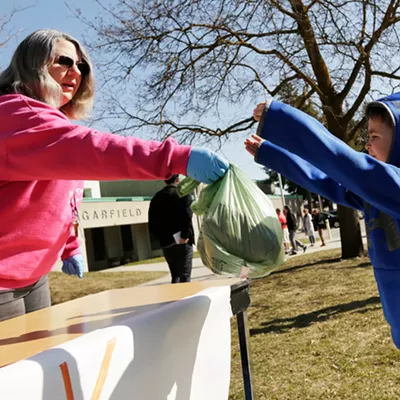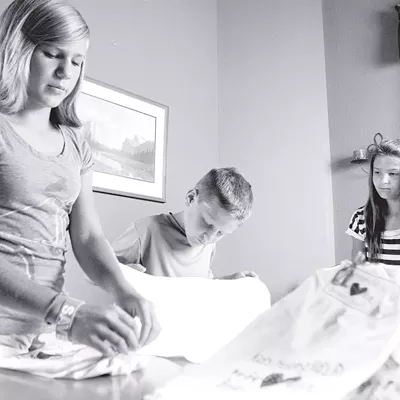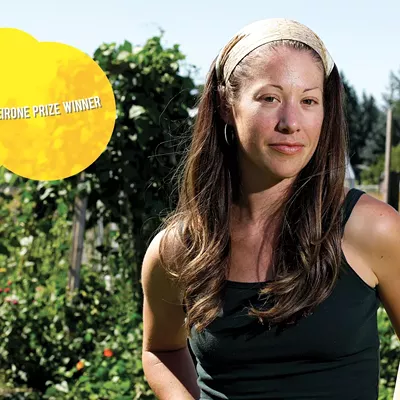Philanthropy 2011
PEIRONE PRIZE WINNERS
Bart Mihailovich
Keeping the river
Brent and Amy Hendricks
Helping refugees
Korrine Kreilkamp
Feeding a city
Give!
Click here to start giving
Michael Metters used to want to be an actor. That’s what he went to college for. But, as is the case with so many would-be-actors, that didn’t work out. So now’s he’s a self-employed headhunter, finding salesmen for executives.
But when he enters Spokane’s Bryant Elementary, he’s a star.
“When I walk in, the kids go nuts,” Metters says. “They run to you and hug you … They just scream, they’re just so excited.”
Metters, 47, comes bearing books. And not just books. He also brings music, a felt board, props, and a full complement of personalities and voices that he uses to bring the storybook characters alive. The cow. The chicken. The peacock. He’s acting again, in a way. The elementary school classroom is his stage. A rapt crowd of schoolchildren is his audience.
He sends home a letter to the children’s parents about what they read that day. Sometimes, the kids take a few of the books home — maybe the story of Tom the Fool or the story of the little rat — and come back, excitedly telling Metters how much their parents loved the book.
And that’s the key, taking the next step beyond storytime — giving children, many of whom are growing up in low-income, book-free households, the books they need to learn how to read.
“Believe it or not, these kids don’t own any books,” Metters says. “Is that insane?”
Metters volunteers with a nonprofit called Page Ahead. In 1990, when the organization was first founded by the Seattle Chamber of Commerce, Page Ahead was called Books for Kids — intended simply to raise donations to provide kids with books. But soon the team of volunteers got a coordinator, it went statewide, and it expanded its purpose. Now, Page Ahead distributes books for children, sends volunteers like Metters to read in kindergarten and preschool classrooms, and runs workshops to help low-income parents teach their children how to read.
In Spokane County this year, Page Ahead plans to give away 6,229 books to 2,136 children. Deer Park Elementary will receive 1,425 books. Cooper Elementary gets 1,644 books. The grand total in Spokane County since 1994 adds up to 97,000 books.
These days, that’s vital. Nationally, about 10 million children have trouble learning to read, according to the National Information Center for Children and Youth with Disabilities. In the Spokane Public Schools district, 655 fourth-graders came in below standard on their reading tests. Jane Bouge, a literacy coach with the district for 10 years, says modern technology has pulled kids away from books, making it harder to teach them how to read.
The modern home has more options — shinier, louder, more bombastic — for entertainment. They’re deluged with TV, movies, video games, computer games, cell phone games, and reading often doesn’t get beyond “press play” or “player two.”
“When we ask kids about if they’re reading at home, they say no,” Bouge says. “They are watching TV, they are watching movies, they are playing computer games. They don’t have books at home, or they don’t have books at their reading level.”
Struggling to read can ripple outward, even in early years, a National Institute of Child Health and Development study found. Most who have trouble reading in kindergarten have trouble reading in third grade. And how well you read in fourth-grade can predict success in high school, in college, even how much money they will make over their lifetimes. Of those 10 million children who don’t know how to read, in other words, a mere 2 percent will eventually get a four-year diploma.
Most prisoners — seven out of 10 — are at the lowest levels of literacy. A few states, a Jumpstart study reports, even predict how many prisons to build by how many elementary school students can’t read at their grade level.
But there’s good news, too. As if through osmosis, just the presence of books in the home helps kids. Parental education has long been lifted up as a crucial, common-sense predictor of a child’s future academic success. But a 20-year study at the University of Nevada found that the number of books in a home has an even more dramatic impact. Having 500 books in a home, as opposed to none, propels children forward in their educational attainment as dramatically as having a university-educated parent instead of a barely literate parent.
Page Ahead can’t give every kid 500 books. They start with just three.
Something special happens three times a year at Cooper Elementary, on Spokane’s north side. All 550 students, from the youngest first-grader to the oldest second-grader, get to choose a free book — any book they want.
Cooper applies to Page Ahead for a book grant, describing the needs of their school and how they plan to give away the books.
Most of the time, these giveaways are big events, big festivals. It may be a part of the end-of-the-year barbecue, or coupled with a visit from a children’s-book author, or as part of a larger writing festival. Sometimes, at Cooper Elementary, there will be two book giveaways. One room holds the new books from Page Ahead, while the other contains used books that students have donated a month in advance. Assistant Principal Shawna Fraser says the effect — and the excitement — is visible.
“I believe it has had an impact on students’ achievement and joy of reading and excitement at selecting books,” she says. “They show their books off proudly.”
And these are new books — no ancient, dog-eared, yellowed hand-me-downs. Jacki Crowther, book program manager for Page Ahead, says that giving new books is an important part of the Page Ahead strategy. Many of the children who receive the books come from low-income backgrounds. They haven’t received much of anything new before. This makes it special.
“We feel like giving them a gift,” Crowther says. “We want them to get excited about reading.”
Letters sent to Page Ahead headquarters from grateful kids seem to indicate that they know the difference. From a kid named Renton, at Shiloh Hills Elementary: “Thank you for your kindness. I’m glad to get my book — my parents couldn’t buy me a book like that.”
























